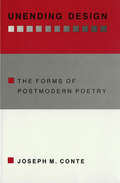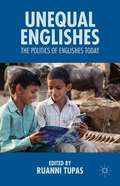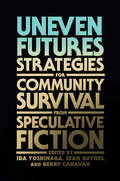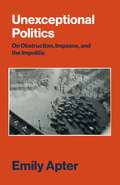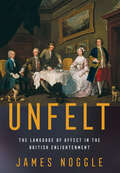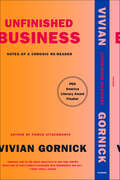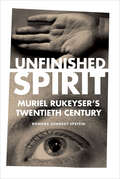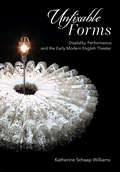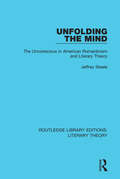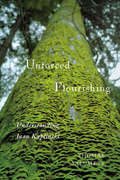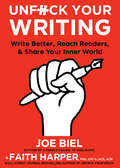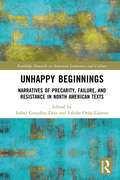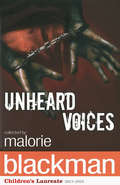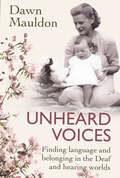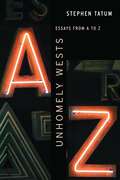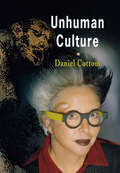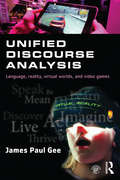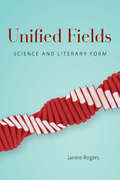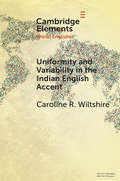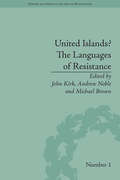- Table View
- List View
Unending Design: The Forms of Postmodern Poetry
by Joseph M. ConteDrawing on the work of contemporary American poets from Ashbery to Zukofsky, Joseph M. Conte elaborates an innovative typology of postmodern poetic forms. In Conte's view, looking at recent poetry in terms of the complementary methods of seriality and proceduralism offers a rewarding alternative to the familiar analytic dichotomy of "open" and "closed" forms.
Unequal Englishes
by Ruanni TupasUnequal Englishes challenges the widely held assumption that languages and linguistic varieties are equal, and explores the various ways we can understand, examine and transform inequalities of Englishes. Written by engaging and well-known scholars of language, education and politics, the chapters in the volume offer a wide range of perspectives on the complex but interwoven relationships between inequalities and Englishes, with an expansive geopolitical trajectory which includes the Philippines, Cuba, China, Canada, India, Malaysia, the United States, Singapore and South Korea. Their specific social and ideological contexts of analyses are wide-ranging, including textbooks and classrooms; teachers, would-be teachers and students; call centers; linguistic landscapes; stories, narratives and jokes. The volume mobilizes the notion of unequal Englishes as one way to understand the global spread of English today.
Uneven Futures: Strategies for Community Survival from Speculative Fiction
by Gerry Canavan Sean Guynes Ida YoshinagaEssays on speculative/science fiction explore the futures that feed our most cherished fantasies and terrifying nightmares, while helping diverse communities devise new survival strategies for a tough millennium.The explosion in speculative/science fiction (SF) across different media from the late twentieth century to the present has compelled those in the field of SF studies to rethink the community&’s identity, orientation, and stakes. In this edited collection, more than forty writers, critics, game designers, scholars, and activists explore core SF texts, with an eye toward a future in which corporations dominate both the means of production and the means of distribution and governments rely on powerful surveillance and carceral technologies. The essays, international in scope, demonstrate the diversity of SF through a balance of popular mass-market novels, comics, films, games, TV shows, creepypastas, and more niche works. SF works explored range from Riot Baby by Tochi Onyebuchi, 2084: The End of the World by Boualem Sansal, Terra Nullius by Claire Coleman, Watchmen and X-Men comics, and the Marvel film Captain America: The Winter Soldier, to the MaddAddam trilogy by Margaret Atwood, The Dispossessed by Ursula K. Le Guin, The Wandering Earth by Liu Cixin, and the Wormwood trilogy by Tade Thompson. In an era in which ecological disaster and global pandemics regularly expose and intensify deep political-economic inequalities, what futures has SF anticipated? What survival strategies has it provided us? Can it help us to deal with, and grow beyond, the inequalities and injustices of our times? Unlike other books of speculative/science fiction criticism, Uneven Futures uses a think piece format to make its critical insights engaging to a wide audience. The essays inspire visions of better possible futures—drawing on feminist, queer, and global speculative engagements with Indigenous, Latinx, and Afro- and African futurisms—while imparting important lessons for political organizing in the present.Contributors: Ben Abraham, Emmet Asher-Perrin, Brent Ryan Bellamy, Gerry Canavan, Andrew Ferguson, Fabio Fernandes, Dexter Gabriel, M. Elizabeth Ginway, Sean Guynes, Ouissal Harize, David M. Higgins, Veronica Hollinger, Allanah Hunt, Nicola Hunte, Nathaniel Isaacson, Ayana Jamieson, Darshana Jayemanne, Gwyneth Jones, Brendan Keogh, Sami Ahmad Khan, Cameron Kunzelman, Bryan Kamaoli Kuwada, Isiah Lavender III, Caryn Lesuma, Karen Lord, Sarah Marrs, Farah Mendlesohn, Cathryn Merla-Watson, Hugh Charles O&’Connell, B. Pladek, John Rieder, Lysa Rivera, Kim Stanley Robinson, Steven Shaviro, Rebekah Sheldon, Alison Sperling, Alfredo Suppia, Bogi Takács, Taryne Jade Taylor, Sherryl Vint, Kirin Wachter-Grene, Ida Yoshinaga.
Unexceptional Politics: On Obstruction, Impasse, and the Impolitic
by Emily ApterA new vision of politics “below the radar”One way to grasp the nature of politics is to understand the key terms in which it is discussed. Unexceptional Politics develops a political vocabulary drawn from a wide range of media (political fiction, art, film, and TV), highlighting the scams, imbroglios, information trafficking, brinkmanship, and parliamentary procedures that obstruct and block progressive politics. The book reviews and renews modes of thinking about micropolitics that counter notions of the “state of exception” embedded in theories of the “political” from Thomas Hobbes to Carl Schmitt. Emily Apter develops a critical model of politics behind the scenes, a politics that operates outside the norms of classical political theory. She focuses on micropolitics, defined as small events, happening in series, that often pass unnoticed yet disturb and interfere with the institutional structures of capitalist parliamentary systems, even as they secure their reproduction and longevity. Apter’s experimental glossary is arranged under headings that look at the apparently incidental, immaterial, and increasingly virtual practices of politicking: “obstruction,” “obstinacy,” “psychopolitics,” “managed life,” “serial politics.” Such terms frame an argument for taking stock of the realization that we really do not know what politics is, where it begins and ends, or how its micro-events should be described.
Unfelt: The Language of Affect in the British Enlightenment
by James NoggleUnfelt offers a new account of feeling during the British Enlightenment, finding that the passions and sentiments long considered as preoccupations of the era depend on a potent insensibility, the secret emergence of pronounced emotions that only become apparent with time. Surveying a range of affects including primary sensation, love and self-love, greed, happiness, and patriotic ardor, James Noggle explores literary evocations of imperceptibility and unfeeling that pervade and support the period's understanding of sensibility.Each of the four sections of Unfelt—on philosophy, the novel, historiography, and political economy—charts the development of these idioms from early in the long eighteenth century to their culmination in the age of sensibility. From Locke to Eliza Haywood, Henry Fielding, and Frances Burney, and from Dudley North to Hume and Adam Smith, Noggle's exploration of the insensible dramatically expands the scope of affect in the period's writing and thought.Drawing inspiration from contemporary affect theory, Noggle charts how feeling and unfeeling flow and feed back into each other, identifying emotional dynamics at their most elusive and powerful: the potential, the incipient, the emergent, the virtual.
Unfinished Business: Notes of a Chronic Re-reader
by Vivian GornickA New York Times Book Review Editors' Choice. One of Library Journal's Best Books of 2020. One of our most beloved writers reassess the electrifying works of literature that have shaped her lifeI sometimes think I was born reading . . . I can’t remember the time when I didn’t have a book in my hands, my head lost to the world around me.Unfinished Business: Notes of a Chronic Re-reader is Vivian Gornick’s celebration of passionate reading, of returning again and again to the books that have shaped her at crucial points in her life. In nine essays that traverse literary criticism, memoir, and biography, one of our most celebrated critics writes about the importance of reading—and re-reading—as life progresses. Gornick finds herself in contradictory characters within D. H. Lawrence’s Sons and Lovers, assesses womanhood in Colette’s The Vagabond and The Shackle, and considers the veracity of memory in Marguerite Duras’s The Lover. She revisits Great War novels by J. L. Carr and Pat Barker, uncovers the psychological complexity of Elizabeth Bowen’s prose, and soaks in Natalia Ginzburg, “a writer whose work has often made me love life more.” After adopting two cats, whose erratic behavior she finds vexing, she discovers Doris Lessing’s Particularly Cats. Guided by Gornick’s trademark verve and insight, Unfinished Business is a masterful appreciation of literature’s power to illuminate our lives from a peerless writer and thinker who “still read[s] to feel the power of Life with a capital L.”
Unfinished Spirit: Muriel Rukeyser's Twentieth Century
by Rowena Kennedy-EpsteinIn Unfinished Spirit, Rowena Kennedy-Epstein brings to light the extraordinary archive of Muriel Rukeyser's (1913–1980) unpublished and incomplete literary works, revealing the ways in which misogyny influences the kinds of texts we read and value. Despite her status today as an influential poet, much of Rukeyser's critical and feminist writing remained unfinished, suppressed by the sexism of editors, political censure, the withdrawal of funding and publishing contracts, as well the conditions of single motherhood and economic precarity.From Savage Coast, her novel of the Spanish Civil War (which Kennedy-Epstein recovered, edited, and published to great acclaim in 2013) to her photo-text collaboration with Berenice Abbott, essays on women writers, radio scripts, and biographies, Unfinished Spirit traces the creation, reception, and rejection of Rukeyser's most ambitious texts—works that continued the radical, avant-garde project of modernism and challenged an increasingly hegemonic Cold War culture. Bound together by Rukeyser's radical vision of artistic creation and political engagement, these incomplete texts open a space to theorize the politics of the unfinished for understanding women's artistic production, reasserting the importance of the archive as a primary site of feminist criticism.
Unfixable Forms: Disability, Performance, and the Early Modern English Theater
by Katherine Schaap WilliamsUnfixable Forms explores how theatrical form remakes—and is in turn remade by—early modern disability. Figures described as "deformed," "lame," "crippled," "ugly," "sick," and "monstrous" crowd the stage in English drama of the sixteenth and seventeenth centuries. In each case, such a description distills cultural expectations about how a body should look and what a body should do—yet, crucially, demands the actor's embodied performance. In the early modern theater, concepts of disability collide with the deforming, vulnerable body of the actor. Reading dramatic texts alongside a diverse array of sources, ranging from physic manuals to philosophical essays to monster pamphlets, Katherine Schaap Williams excavates an archive of formal innovation to argue that disability is at the heart of the early modern theater's exploration of what it means to put the body of an actor on the stage. Offering new interpretations of canonical works by William Shakespeare, Ben Jonson, Thomas Dekker, Thomas Middleton, and William Rowley, and close readings of little-known plays such as The Fair Maid of the Exchange and A Larum For London, Williams demonstrates how disability cuts across foundational distinctions between nature and art, form and matter, and being and seeming. Situated at the intersections of early modern drama, disability studies, and performance theory, Unfixable Forms locates disability on the early modern stage as both a product of cultural constraints and a spark for performance's unsettling demands and electrifying eventfulness.
Unfolding the Mind: The Unconscious in American Romanticism and Literary Theory (Routledge Library Editions: Literary Theory #25)
by Jeffrey SteeleAmerican writers in the 1830’s and 1840’s felt the need for a new terminology to express their awakening perception of "new" aspects of the mind. Without words like the "unconscious" vast areas of the psyche would have remained unexpressed and thus unapproachable. This "discovery" of the unconscious constitutes to the theme of this study, which was first published in 1987. This title will be of interest to students of literary theory.
Unfolding the Mind: The Unconscious in American Romanticism and Literary Theory (Routledge Library Editions: Literary Theory)
by Jeffrey SteeleAmerican writers in the 1830s and 1840s felt the need for a new terminology to express their awakening perception of "new" aspects of the mind. Without words like the "unconscious" vast areas of the psyche would have remained unexpressed and thus unapproachable. This "discovery" of the unconscious constitutes to the theme of this study, which was first published in 1987. This title will be of interest to students of literary theory.
Unforced Flourishing
by Thomas SalumetsAre we ill-suited for this world? Among Europe's major contemporary poets, Estonia's Jaan Kaplinski offers a rare vision of human advancement and fulfillment: the less we intervene the more we flourish. But how then can we remain involved in what evolves of its own accord? How can we move away from a life forged by human design towards a quietly attentive yet spontaneous responsiveness? In Unforced Flourishing, Thomas Salumets seeks access to Kaplinski's life and work and finds a path to the signature of his thinking. He uncovers a man who craves human closeness that few, if any, can provide, a writer drawn towards wordless communication in a world of words, signs, and symbols, who yearns for the sacred in secular times, and who detects more richness in nature than in the human imagination. Salumets describes Kaplinski as an intellectual attracted to a contrarian sense of self, art, and culture, who searches for his homeland's mystical connections at a time when Estonia firmly aligns with values and modes of thought vastly different from his own. What emerges is a mentality firmly rooted in the belief that the greatest risk to human fulfillment results from human beings themselves. The first major study in English of one of Eastern Europe's most important literary figures, Unforced Flourishing details Kaplinski's embrace of that which is undifferentiated, intuitive, non-calculative, and natural in the modern world.
Unforced Flourishing: Understanding Jaan Kaplinski
by Thomas SalumetsAre we ill-suited for this world? Among Europe's major contemporary poets, Estonia's Jaan Kaplinski offers a rare vision of human advancement and fulfillment: the less we intervene the more we flourish. But how then can we remain involved in what evolves of its own accord? How can we move away from a life forged by human design towards a quietly attentive yet spontaneous responsiveness? In Unforced Flourishing, Thomas Salumets seeks access to Kaplinski's life and work and finds a path to the signature of his thinking. He uncovers a man who craves human closeness that few, if any, can provide, a writer drawn towards wordless communication in a world of words, signs, and symbols, who yearns for the sacred in secular times, and who detects more richness in nature than in the human imagination. Salumets describes Kaplinski as an intellectual attracted to a contrarian sense of self, art, and culture, who searches for his homeland's mystical connections at a time when Estonia firmly aligns with values and modes of thought vastly different from his own. What emerges is a mentality firmly rooted in the belief that the greatest risk to human fulfillment results from human beings themselves. The first major study in English of one of Eastern Europe's most important literary figures, Unforced Flourishing details Kaplinski’s embrace of that which is undifferentiated, intuitive, non-calculative, and natural in the modern world.
Unfuck Your Writing: Write Better, Reach Readers, & Share Your Inner World
by Joe Biel Faith G. Harper, PhD, LPC-S, ACS, ACNWant to be a writer, but the words won't come? Do you have a lot to say but don't know how to write it so people will read it? Do you struggle with anxiety, procrastination, or feeling like an imposter around your writing? Microcosm's two most prolific authors teach you their tricks of the trade in this no-nonsense, practical guide to the craft of writing longform work. Learn skills like setting and sticking to goals, communicating effectively with your writing, having fun while writing, working with an editor, and creating reader-oriented work. This is not a book about crafting beautiful sentences with perfect grammar; instead Harper and Biel will teach you to write so that your words have the greatest possible impact on the world.
Unhappy Beginnings: Narratives of Precarity, Failure, and Resistance in North American Texts (Routledge Research in American Literature and Culture)
by Isabel González-Díaz Fabián Orán-LlarenaThis book offers the analysis of a selection of North American texts that dismantle and resist normative frames through the resignification of concepts such as unhappiness, precarity, failure, and vulnerability. The chapters bring to the fore how those potentially negative elements can be refigured as ambivalent sites of resistance and social bonding. Following Sara Ahmed’s rereading of happiness, other authors such as Judith Butler, Wendy Brown, Jack Halberstam, Lauren Berlant, or Henry Giroux are mobilized to interrogate films, memoirs, and novels that deal with precarity, alienation, and inequality. The monograph contributes to enlarging the archives of unhappiness by changing the focus from prescribed norms and happy endings to unruly practices and unhappy beginnings. As the different contributors show, unhappiness, precarity, vulnerability, or failure can be harnessed to illuminate ways of navigating the world and framing society that do not necessarily conform to the script of happiness—whatever that means.
Unheard Voices: An Anthology of Stories and Poems to Commemorate the Bicentenary Anniversary of the Abolition of the Slave Trade
by Malorie BlackmanIn March 1807, the British Parliament passed an Act making the trading and transportation of slaves illegal. It was many years before slavery, as it was known then, was abolished, and slavery still continues today in different ways, but it was a big step forward towards the empancipation of a people. Malorie Blackman has drawn together some of the finest of today's writers and poets to contribute to this important anthology. Their short stories and poems sit alongside first-hand accounts of slavery from freed slaves, making a fascinating and absorbing collection that remembers and commemorates one of the most brutal and long-lasting inflictions of misery that human beings have inflicted upon other human beings.
Unheard Voices: Finding language and belonging in the Deaf and hearing worlds
by Dawn MauldonIn this poignant and powerful memoir, the author tells the story of their childhood growing up with Deaf parents. Through intimate and evocative prose, Dawn explores the challenges and joys of living in a world that is often hostile and unwelcoming to those who are different.From the isolation and challenges that come with being a child of Deaf parents, to the strength and resilience that comes with love and belonging, the author shares their unique and deeply personal perspective on what it means to see and communicate in a richly silent world.This book is a must-read for anyone interested in the Deaf experience, and the power of love and belonging to overcome adversity. Beautifully written and deeply moving, Unheard Voices is an exploration of what it means to be a part of a diverse and vibrant culture.
Unhomely Wests: Essays from A to Z (Postwestern Horizons)
by Stephen TatumIn Unhomely Wests Stephen Tatum presents twenty-six essays exploring selected literary, visual art, cinematic, and musical representations of homelessness as a theme, a trope, an affliction, a threat, and a condition of alienation in the late modern and postmodern American West. Arranged in alphabetical order, from &“Alphabet/Abecedario&” to &“Zombieland,&” Tatum&’s essays aim to discover how his eclectic selection of texts both produce uncanny literary effects and bear witness to the entangled capitalist, geopolitical, and ecological crises that shape our external world and our &“unhomely&” textual worlds. In keeping with the etymological and conceptual linkage between the unhomely and the uncanny, Tatum&’s critical meditations focus on both uncanny textual architectures and architecturally unhomely junkspaces of abandonment and ruin, of corporeal displacement, and of cognitive or affective disorientation. And since an emergent unhomely structure of feeling exposes how our lived present is saturated with history&’s apparitional revenants, this collection of essays—comprising a new lexicon of unhomely Wests—conveys a hauntology underwritten by spectrality as a theme, a trope, an image. Committed to revising the conventional academic text, Unhomely Wests exemplifies Roland Barthes&’s directive that we consider the alphabetic order as a call to &“Cut! Resume the story in another way!&”
Unhuman Culture
by Daniel CottomIt is widely acknowledged that the unhuman plays a significant role in the definition of humanity in contemporary thought. It appears in the thematization of "the Other" in philosophical, psychoanalytic, anthropological, and postcolonial studies, and shows up in the "antihumanism" associated with figures such as Heidegger, Foucault, and Derrida. One might trace its genealogy, as Freud did, to the Copernican, Darwinian, and psychoanalytic revolutions that displaced humanity from the center of the universe. Or as Karl Marx and others suggested, one might lose human identity in the face of economic, technological, political, and ideological forces and structures.With dazzling breadth, wit, and intelligence, Unhuman Culture ranges over literature, art, and theory, ancient to postmodern, to explore the ways in which contemporary culture defines humanity in terms of all that it is not. Daniel Cottom is equally at home reading medieval saints' lives and the fiction of Angela Carter, plumbing the implications of Napoleon's self-coronation and the attacks of 9/11, considering the paintings of Pieter Bruegel and the plastic-surgery-as-performance of the body artist Orlan.For Cottom, the unhuman does not necessarily signify the inhuman, in the sense of conspicuous or extraordinary cruelty. It embraces, too, the superhuman, the supernatural, the demonic, and the subhuman; the supposedly disjunctive animal, vegetable, and mineral kingdoms; the realms of artifice, technology, and fantasy. It plays a role in theoretical discussions of the sublime, personal memoirs of the Holocaust, aesthetic reflections on technology, economic discourses on globalization, and popular accounts of terrorism. Whereas it once may have seemed that the concept of culture always, by definition, pertained to humanity, it now may seem impossible to avoid the realization that we must look at things differently. It is not only art, in the narrow sense of the word, that we must recognize as unhuman. For better or worse, ours is now an unhuman culture.
Unified Discourse Analysis: Language, Reality, Virtual Worlds and Video Games
by James Paul GeeDiscourse Analysis is becoming increasingly "multimodal", concerned primarily with the interplay of language, image and sound. Video Games allow humans to create, live in and have conversations with new multimodal worlds. In this ground-breaking new textbook, best-selling author and experienced gamer, James Paul Gee, sets out a new theory and method of discourse analysis which applies to language, the real world, science and video games. Rather than analysing the language of video games, this book uses discourse analysis to study games as communicational forms. Gee argues that language, science, games and everyday life are deeply related and each is a series of conversations. Discourse analysis should not be just about language, but about human interactions with the world, with games, and with each other, interactions that make meaning and sustain lives amid risk and complexity. Written in a highly accessible style and drawing on a wide range of video games from World of Warcraft and Chibi-Robo to Tetris, this engaging textbook is essential reading for students in discourse analysis, new media and digital culture.
Unified Fields
by Janine RogersLiterary form presents an important opportunity for understanding the relationship between literature and science. Through a series of close readings of poetry and prose, Unified Fields demonstrates that formal structures in literature can relate to scientific concepts through their essential interpretive functions. Janine Rogers engages with a wide range of writing from Canadian, British, and American authors, including the poetry of Elizabeth Bishop and Robyn Sarah as well as prose by Margaret Atwood, Ian McEwan, and Stephen Hawking. She employs an interdisciplinary approach combining formalist, historical, and theoretical literary practice, informed by interpretive frameworks developed in the philosophy of science. Although dedicated to contemporary texts, Rogers's analysis is frequently rooted in historical contexts of form, including Euclidean geometry and medieval romance, developed when the distinction between literature and science was not so drastic. These historical connections demonstrate that continuities of form resonate in both contemporary literature and science. Through critical analysis and engaging prose, Unified Fields bridges an important disciplinary gap by revealing how literary practice informs scientific understanding.
Unified Fields: Science and Literary Form
by Janine RogersLiterary form presents an important opportunity for understanding the relationship between literature and science. Through a series of close readings of poetry and prose, Unified Fields demonstrates that formal structures in literature can relate to scientific concepts through their essential interpretive functions. Janine Rogers engages with a wide range of writing from Canadian, British, and American authors, including the poetry of Elizabeth Bishop and Robyn Sarah as well as prose by Margaret Atwood, Ian McEwan, and Stephen Hawking. She employs an interdisciplinary approach combining formalist, historical, and theoretical literary practice, informed by interpretive frameworks developed in the philosophy of science. Although dedicated to contemporary texts, Rogers's analysis is frequently rooted in historical contexts of form, including Euclidean geometry and medieval romance, developed when the distinction between literature and science was not so drastic. These historical connections demonstrate that continuities of form resonate in both contemporary literature and science. Through critical analysis and engaging prose, Unified Fields bridges an important disciplinary gap by revealing how literary practice informs scientific understanding.
Uniformity and Variability in the Indian English Accent (Elements in World Englishes)
by Caroline R. WiltshireThe sounds of Indian English are distinct and recognizable to outsiders, while insiders perceive variations in how English has developed in this large diverse population. What characteristics mark the unity? Which are clues to a speaker's origins or identity? This Element synthesizes research over the past fifty years and adds to it, focusing on selected features of consonants, vowels, and suprasegmentals (stress, intonation, rhythm) to understand the characteristics of Indian English accents and sources of its uniformity and variability. These accent features, perceptible by humans and discoverable by computational approaches, may be used in expressing identity, both local and pan-Indian.
Unison Reading: Socially Inclusive Group Instruction for Equity and Achievement
by Cynthia MccallisterUnison Reading engages students as they read content aloud in small, diverse groups. Results include increased equity, social engagement, collaborative learning, and student achievement.
United Islands? The Languages of Resistance (Poetry and Song in the Age of Revolution #1)
by John KirkThis is the first title in a new series called Poetry and Song in the Age of Revolution. This series will appeal to those involved in English literary studies, as well as those working in fields of study that cover Enlightenment, Romanticism and Revolution in the last quarter of the eighteenth century.
United States Government: Democracy in Action, Guided Reading Activities
by McGraw-Hill StaffThe United States Government: Democracy in Action Guided Reading Activities provides activities for students who would benefit from a review of the material. By focusing on key information and concepts, Guided Reading Activities help students to understand and make appropriate connections among the ideas and facts they encounter in the student text.
